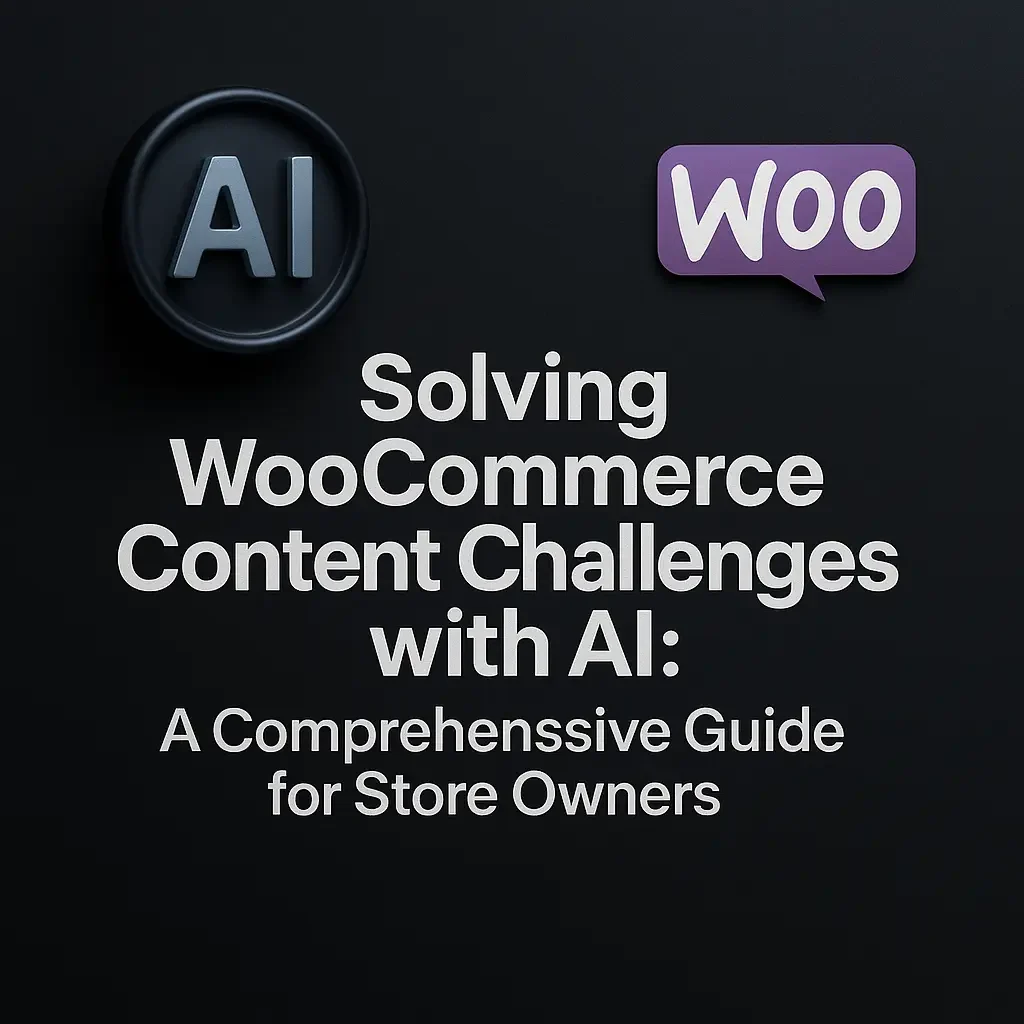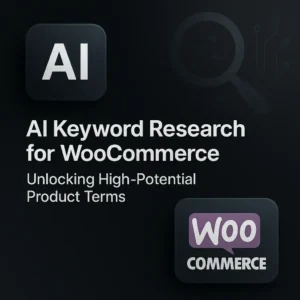WooCommerce store owners, despite operating on an SEO-friendly platform like WordPress , frequently encounter a range of content-related challenges that can hinder their online visibility, customer experience, and conversion rates. These challenges often stem from the sheer volume of products, the need for unique and engaging content, and the complexities of SEO. Artificial intelligence offers a powerful suite of solutions to address these pain points, transforming how e-commerce content is created, managed, and optimized.
Common Content Challenges Faced by WooCommerce Store Owners
Managing product content in a WooCommerce store can be surprisingly complex, especially as inventory grows. Several recurring issues impact efficiency and effectiveness:
- Duplicate and Thin Content: A pervasive problem is the presence of duplicate or near-identical content, particularly for product variations (e.g., same shirt in different colors) or when relying on manufacturer-provided descriptions. Search engines may penalize sites for this, leading to lower rankings or even ignoring pages. Pages with very short content offering little added value are also deprioritized.
- Keyword Cannibalization: When multiple similar pages compete for the same keywords, it dilutes their ranking power and hurts the visibility of all of them. This can confuse search engines about which page is most relevant.
- Time and Effort for Manual Creation: Writing unique, high-quality, and SEO-optimized descriptions and titles for every product is incredibly time-consuming and repetitive, especially for large catalogs. This manual labor can quickly overwhelm content teams and slow down product launches.
- Inconsistent Brand Voice: As content creation scales or involves multiple writers, maintaining a consistent brand voice, tone, and style across all product listings becomes difficult, potentially diluting brand identity.
- Lack of SEO Optimization: Many product descriptions and titles lack proper keyword integration, compelling meta descriptions, or adherence to best practices, leading to poor search engine visibility.
- Inefficient Updates: Updating product information, features, or promotional details across a large inventory can be cumbersome, leading to outdated content that misinforms customers and harms SEO.
- Performance Issues: While not directly content creation, heavy images, long descriptions, and other content-related technical issues can slow down site loading times, negatively impacting user experience and SEO.
- Limited Customization Control: Many traditional content tools or basic WooCommerce setups offer minimal control over content presentation and customization, making it hard to create engaging layouts or tailor information effectively.
How AI Solves These WooCommerce Content Challenges
Artificial intelligence provides a robust framework for addressing these challenges, offering solutions that enhance efficiency, scalability, accuracy, and overall content quality for WooCommerce stores:
- Automating Content Generation at Scale: AI product content generators revolutionize the process by automating the creation of product descriptions, titles, and tags in seconds. This automation handles the “repetitive and redundant tasks” , allowing store owners to generate content for hundreds or thousands of items without significant manual effort. This directly tackles the time and effort challenge, enabling rapid product launches and updates.
- Ensuring Content Uniqueness and Quality: AI tools, when provided with detailed inputs and leveraging custom fields, can generate unique and original content for each product, even for similar variations. This directly combats duplicate content issues, helping WooCommerce sites avoid penalties and improve search rankings. The focus shifts to creating content that provides “substantial, complete, or comprehensive description” and “valuable information” for the user.
- Optimizing for SEO and User Intent: AI tools are designed to integrate relevant keywords naturally, aligning content with current search trends and user intent. They help create SEO-friendly titles and descriptions that improve visibility and click-through rates. AI can also assist in identifying and resolving keyword cannibalization issues by suggesting content adjustments or canonical tags.
- Maintaining Brand Consistency: By defining a specific tone and style within the AI tool, businesses can ensure that all generated content adheres to a consistent brand voice. This uniformity reinforces brand identity across the entire product catalog, building trust and professionalism.
- Streamlining Content Updates: AI facilitates efficient bulk updates of existing content. If product features change or a new brand voice is adopted, AI rulesets can be applied to quickly refresh descriptions and titles across numerous listings, ensuring information remains accurate and optimized.
- Enhancing Customer Experience: Beyond direct content generation, AI can improve customer service through chatbots, offer personalized product recommendations based on browsing history, and conduct A/B testing to optimize pricing or product categories. This holistic approach to content and customer interaction boosts conversion rates.
- Leveraging Existing Data: Advanced AI plugins for WooCommerce can integrate with existing custom fields and product attributes. This allows the AI to pull specific product data directly into prompts, generating highly targeted and accurate content without manual data entry.
Challenges and Considerations When Using AI for WooCommerce Content
While AI offers immense benefits, store owners must be aware of potential challenges:
- Ensuring Accuracy and Mitigating “Hallucinations”: AI systems are primarily accurate based on their training data. If input data contains misinformation, AI can produce inaccurate content or “hallucinations” (responses that seem true but are not). Rigorous human review and fact-checking are indispensable to prevent errors from reaching live product pages.
- Complexity and Versatility of Tools: Some AI plugins are designed for single, specific issues, potentially requiring multiple installations to achieve full automation, which can increase costs and potentially slow down the website. Managing multiple AI plugins may also require expert support to avoid conflicts.
- Security Concerns: As with any technology handling sensitive data, ensuring the security of AI plugins and the data they process is paramount to protect customer information and maintain store reputation.
- Avoiding Generic Output: Without proper guidance (e.g., specific prompts, custom data integration, tone selection), AI can produce generic or “fluffy” content that lacks unique value. The key is to use AI as a tool to augment human expertise, not replace it, ensuring content provides genuine value and reflects unique brand insights.
By understanding these challenges and implementing best practices, WooCommerce store owners can effectively leverage AI to overcome content creation hurdles, enhance their SEO, improve customer experience, and ultimately drive higher sales. The strategic application of AI transforms content management from a burden into a powerful competitive advantage.




